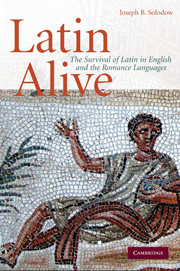Book contents
- Frontmatter
- Contents
- List of Maps
- Acknowledgments
- 1 Introduction
- PART ONE LATIN
- PART TWO THE ROMANCE VOCABULARY
- 7 The Lexicon in General; Shifts in the Meaning of Words
- 8 Changes in the Form of Words
- 9 When Words Collide
- 10 Immigrants
- PART THREE PROTO-ROMANCE, OR WHAT THE LANGUAGES SHARE
- PART FOUR EARLIEST TEXTS AND FUTURE DIRECTIONS, OR WHERE THE LANGUAGES DIVERGE
- Suggestions for Further Reading
- General Index
- Index of English Words
10 - Immigrants
Non-Latin Words in the Romance Languages
Published online by Cambridge University Press: 05 June 2012
- Frontmatter
- Contents
- List of Maps
- Acknowledgments
- 1 Introduction
- PART ONE LATIN
- PART TWO THE ROMANCE VOCABULARY
- 7 The Lexicon in General; Shifts in the Meaning of Words
- 8 Changes in the Form of Words
- 9 When Words Collide
- 10 Immigrants
- PART THREE PROTO-ROMANCE, OR WHAT THE LANGUAGES SHARE
- PART FOUR EARLIEST TEXTS AND FUTURE DIRECTIONS, OR WHERE THE LANGUAGES DIVERGE
- Suggestions for Further Reading
- General Index
- Index of English Words
Summary
Although Latin is by far the leading source of words for the Romance languages, throughout their history both Latin herself and her offspring have adopted words from other languages. Similarly, English has been hospitable – exceptionally so – to words that arrived from elsewhere. The immigrant word typically gets adapted to the grammatical forms of its new setting (if a verb, for instance, it joins one of the conjugations, as we saw with rewardant in the Reichenau Glossary). Sometimes it meets with resistance, yet within a short period it may succeed in making itself at home, and then it is indistinguishable from the native-born. Just as speakers of the languages do not perceive a connection between espalda and espátula or coy and quiet, so they do not recognize angel as Greek, shirt as Scandinavian, or sugar as Arabic. The history of the language is hardly present to their minds. The words simply exist in the language and are available for use.
Why are words welcomed from other languages? Sometimes for reasons reviewed in the previous chapter: convenience of form, distinctiveness, or vividness, examples of which would be Germanic *werra “war” and Greek parabolam “word.” Sometimes, however, because the thing denoted by the word is imported from a foreign culture or associated with it: Etruscan histrionem “actor” or Celtic carpentum “wagon.” Words of the latter type are especially interesting, since they chart the historical and cultural interactions of a people with others.
- Type
- Chapter
- Information
- Latin AliveThe Survival of Latin in English and the Romance Languages, pp. 181 - 198Publisher: Cambridge University PressPrint publication year: 2010



